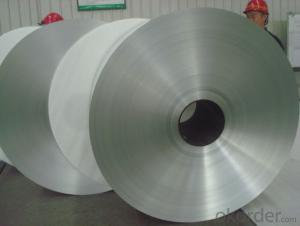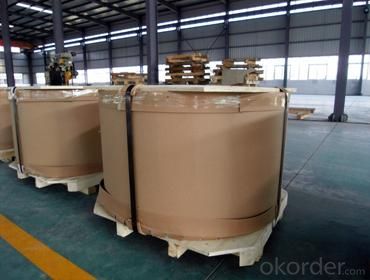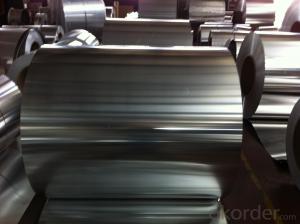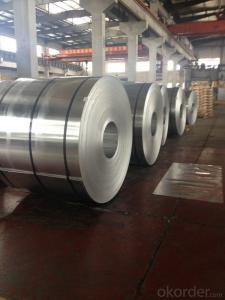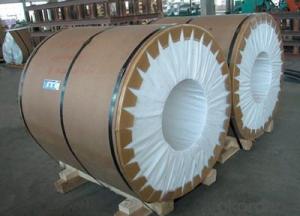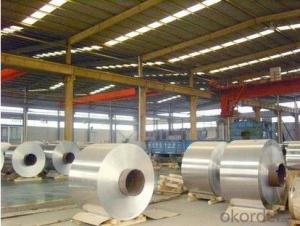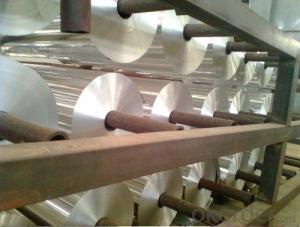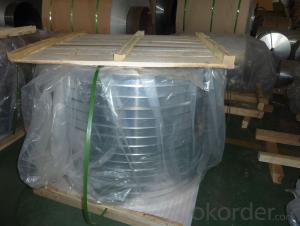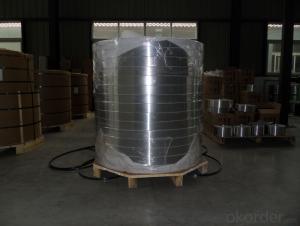Pvc Coated ASTM Grade 8079 Aluminum Strips Belt for Solar
- Loading Port:
- Shanghai
- Payment Terms:
- TT OR LC
- Min Order Qty:
- 5 m.t.
- Supply Capability:
- 500 m.t./month
OKorder Service Pledge
OKorder Financial Service
You Might Also Like
Specification
ASTM Grade 8079 Aluminum Strips Belt For Solar
aluminum coil specifications:
1) Alloy :1050, 1060,1100, 3003 3004 3105 3A21 5005 5052 etc
2) Temper: O/H12/H14/H1/H18/H32/H34/H36/H38//H111/H112/H116/H321/T6/T651/T3/T351 etc
3) Thickness: 0.1mm to 6mm
4) Width:20mm to 3300mm
5)Coil weight: 100kgs to 6 tons depends on actual requirement
6)Core material: Aluminum or paper
7)Coil Inner diameter: 75mm, 150mm, 200mm, 300mm, 405mm, 505mm or as required
8) Protective film can be added
item | 3003 Aluminum coil | |
Standard | GB/T3190-2008,GB/T3880-2006,ASTM B209,JIS H4000-2006,etc | |
Material | 1060,1050,1100 3003,3103,3004,3005,3105 5052, 5454,5754 | |
Size | Thickness | 0.5mm-3.5mm |
Width | 800-1500mm | |
Weight/Roll | About 1.5MT/3MT | |
Quality control | Mill Test Certificate is supplied with shipment, Third Part Inspection is acceptable. | |
Surface | Bright, polished, hair line, brush, checkered, embossed, etc | |
Trade terms | Price term | ,FOB, CNF, CIF, etc |
Payment Term | TT,L/C | |
MOQ | 2MT | |
20 GP Capacity | About 20-25MT | |
Delivery time | 1.The products will delivery immediately after receiving the payment. 2.According to the order quantity, prompt delivery. | |
Export to | Ireland,Singapore,Indonesia,Ukraine,Spain,Canada,USA,Brazil,Thailand,Korea,Iran,India,Egypt,Kuwait, Oman,Viet Nam, South Africa, Dubai, Russia, etc | |
Package | Stick blue film→plastic film→waterproof paper→1~2 tons on a export standard pallet(corner protection) | |
Application | 1)Further making utensil.2)Solar reflective film3)The appearance of the building4)Interior decorating:ceilings,walls,etc.5)Furniture cabinets6)Elevator decoraction7)Signs,nameplate,bags making.8)Decoration inside and outside the car9)Household appliances:refrigerators,microwave ovens,audio equipment,etc.10)The consumer electronics:mobile phones,digital cameras,MP3,etc. | |
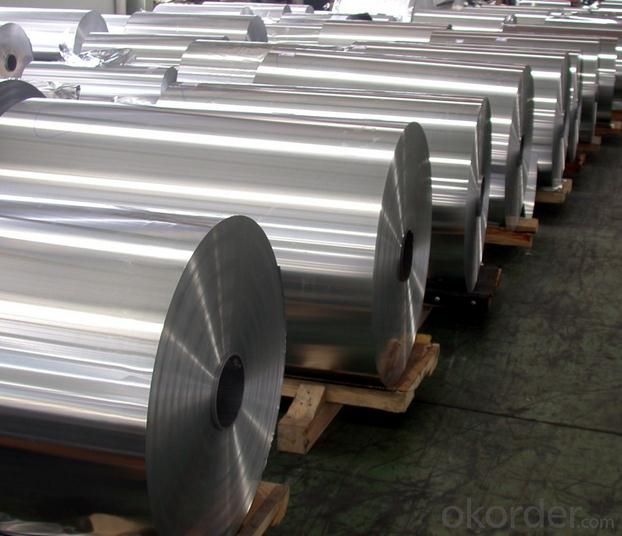
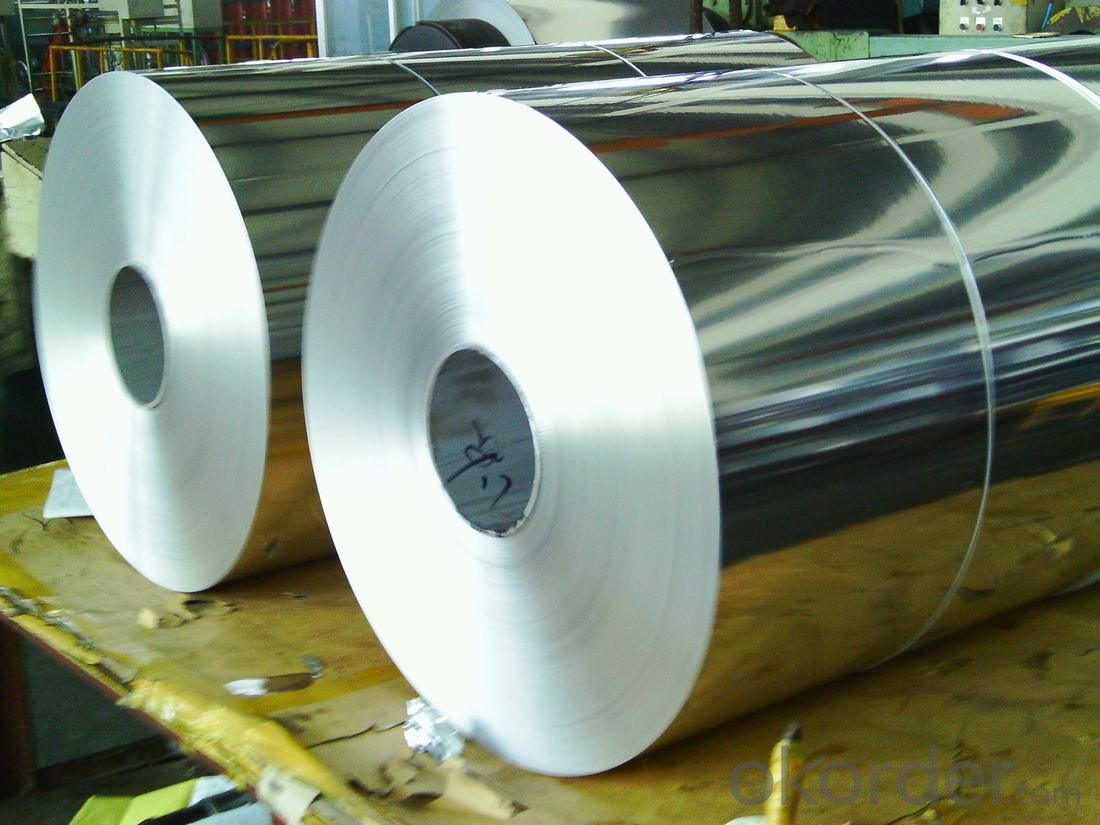
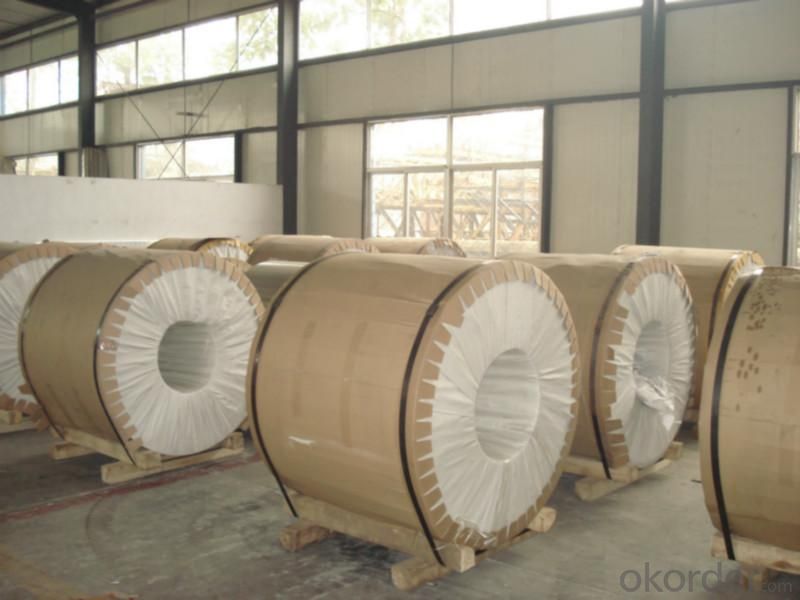
- Q: What are environmentally friendly types of aluminum coil and do they exist?
- <p>Yes, there are environmentally friendly types of aluminum coil. These include recycled aluminum coils, which are made from aluminum that has been reprocessed and reused, reducing the need for new aluminum production and its associated environmental impact. Additionally, aluminum coils with a high recycled content are considered eco-friendly as they contribute to waste reduction and energy conservation. The production of recycled aluminum uses significantly less energy compared to virgin aluminum, making it a more sustainable choice.</p>
- Q: What is the difference between pre-painted and natural aluminum coils?
- There are two types of aluminum coils used in various industries: pre-painted and natural. The surface finish is the main distinguishing factor between these two types. Pre-painted aluminum coils are coated with paint or a protective coating before delivery. This coating is applied in a controlled environment, ensuring a uniform and durable finish. The advantages of pre-painted coils include increased resistance to corrosion, improved appearance, and better ability to withstand weather conditions. They also offer a wide range of color options, which makes them suitable for architectural applications where color matching is important. On the other hand, natural aluminum coils remain untreated and maintain their original metallic appearance. These coils are commonly used in applications where the natural aluminum finish is desired, such as in the production of consumer electronics, automotive parts, and other industrial products. Natural aluminum coils are known for their excellent thermal conductivity, lightweight nature, and high strength-to-weight ratio. In conclusion, the difference between pre-painted and natural aluminum coils lies in their surface finish. Pre-painted coils have a protective layer of paint, providing improved resistance to corrosion, better appearance, and color choices. Natural aluminum coils, on the other hand, retain their original metallic appearance and are often preferred in applications where the natural aluminum finish is desired.
- Q: What is the role of aluminum coils in the construction of power plants?
- The construction of power plants heavily relies on aluminum coils, particularly in their cooling systems. These coils play a vital role in facilitating heat transfer and maintaining efficient cooling within the power plant. When fuel or other energy sources are converted into electricity, power plants generate a significant amount of heat. To prevent overheating and ensure optimal performance, cooling systems are installed to dissipate this excess heat. Key to these cooling systems are the aluminum coils. Typically, the construction of air-cooled condensers and evaporators in the cooling systems involves the use of aluminum coils. These coils enable the transfer of heat from the power plant's equipment to the surrounding air. Their design ensures efficient heat transfer and dissipation by leveraging the high thermal conductivity of aluminum. The incorporation of aluminum coils in power plant construction offers several advantages. Firstly, aluminum is a lightweight material, making it easier to handle and install in large-scale power plants. This contributes to a reduction in construction time and costs. Additionally, aluminum exhibits high resistance to corrosion, guaranteeing the longevity and durability of the coils, even in harsh operating conditions. In addition, aluminum coils possess excellent heat transfer capabilities due to their high thermal conductivity. This characteristic enables them to efficiently transfer heat from the power plant equipment to the cooling medium, typically air. As a result, power plants can maintain stable operating temperatures and prevent equipment failures or performance issues caused by excessive heat buildup. Overall, aluminum coils are indispensable components in power plant construction, especially in the cooling systems. They facilitate efficient heat transfer, promote optimal cooling, and enhance the overall performance and reliability of power plants.
- Q: What specific tools are required for handling and working with aluminum coils?
- <p>Working with aluminum coils typically requires specialized tools to ensure safety and efficiency. These include cutting tools like metal snips or shears designed for aluminum, which are crucial for cutting the coils without damaging them. Additionally, a coil carrier or uncoiler is necessary for handling and unrolling the coils without causing injury or deformation. Protective gear such as gloves and safety glasses is also essential to prevent injuries from sharp edges or debris. For more precise work, a metal straightener or leveling machine may be needed to correct any warping in the aluminum coils.</p>
- Q: What industries commonly use aluminum coils?
- Aluminum coils are utilized by several industries due to the numerous advantageous properties they possess. The automotive industry, for instance, heavily relies on aluminum coils to manufacture components like radiators, condensers, and heat exchangers. Similarly, the construction industry utilizes aluminum coils extensively for applications such as roofing, gutters, and siding, thanks to their lightweight, corrosion-resistant, and durable characteristics. The HVAC industry also extensively employs aluminum coils to produce air handling units, heat pumps, and ductwork. The electrical industry, on the other hand, finds aluminum coils particularly suitable for transformer production due to their high electrical conductivity. Moreover, the packaging industry commonly uses aluminum coils to manufacture cans, containers, and foils. Aluminum's ability to form a protective oxide layer and its excellent heat conductivity make it especially advantageous in this field. Aerospace, marine, and transportation industries also frequently adopt aluminum coils due to their lightweight nature, which aids in enhancing fuel efficiency and overall performance. In conclusion, the versatility, durability, and exceptional physical properties of aluminum make it the preferred material choice for numerous industries that rely on aluminum coils for various applications.
- Q: What are the standard sizes of aluminum coils?
- The standard sizes of aluminum coils can vary depending on the specific industry and application. However, there are a few common standard sizes that are widely used. For general industrial applications, the standard width of aluminum coils ranges from 36 inches to 72 inches. The thickness of these coils typically varies between 0.018 inches to 0.125 inches. The length of the coils can vary, but it is commonly around 1,000 feet or more. In the construction industry, the standard sizes of aluminum coils can be different. The width can range from 24 inches to 48 inches, and the thickness can be between 0.019 inches to 0.032 inches. The length of these coils can also vary depending on the specific project requirements. It is important to note that these sizes are just general guidelines and can vary depending on the specific manufacturer, industry requirements, and customer preferences. It is always recommended to consult with the manufacturer or supplier to determine the exact standard sizes available for aluminum coils in your specific industry.
- Q: Can aluminum coils be used in the production of automotive heat shields?
- Automotive heat shields can indeed utilize aluminum coils. The reason behind aluminum's popularity as a heat shield material lies in its remarkable thermal conductivity and heat resistance characteristics. By utilizing aluminum coils, heat shields can be crafted to be both lightweight and durable, effectively diverting and reflecting heat away from crucial components within the automotive system. Furthermore, the flexibility of aluminum coils enables them to be easily molded and shaped, ensuring a perfect fit for any automotive application.
- Q: What are the different surface finishes for pre-painted aluminum coils?
- The different surface finishes for pre-painted aluminum coils include smooth, textured, embossed, brushed, and metallic finishes.
- Q: Are aluminum coils suitable for beverage can manufacturing?
- Yes, aluminum coils are suitable for beverage can manufacturing. Aluminum is a preferred material for beverage cans due to its various advantageous properties. Firstly, aluminum is lightweight, which makes it easy to transport and handle. This is particularly important for the beverage industry, where large quantities of cans are produced and distributed. Additionally, aluminum is highly malleable, allowing it to be formed into the desired shape without losing its structural integrity. This makes it ideal for can manufacturing, as it can be easily shaped into a can's cylindrical form and withstand the pressure from carbonated beverages. Moreover, aluminum is a non-toxic material, ensuring that it does not contaminate the beverages stored in the cans. It also provides a barrier against light, oxygen, and moisture, which helps to preserve the taste and quality of the beverages. Furthermore, aluminum is recyclable, making it an environmentally friendly choice for can manufacturing. The recycling process for aluminum requires significantly less energy compared to producing new aluminum, making it a sustainable material option. Overall, the suitability of aluminum coils for beverage can manufacturing is evident due to its lightweight nature, malleability, non-toxicity, preservation properties, and recyclability.
- Q: This question asks for the distinctions between aluminum coil and steel coil, focusing on their properties and uses.
- <p>Aluminum coil and steel coil differ in several aspects. Aluminum coil is lightweight, corrosion-resistant, and has good thermal conductivity, making it ideal for applications requiring flexibility and resistance to weathering. It's commonly used in construction, packaging, and electrical applications. Steel coil, on the other hand, is stronger and more durable, suitable for heavy-duty applications. It's often used in automotive, construction, and manufacturing due to its high strength and ability to withstand heavy loads. Steel is also magnetic, which is a property not shared by aluminum. The choice between aluminum and steel coil depends on the specific requirements of the project, such as weight, strength, and environmental resistance.</p>
Send your message to us
Pvc Coated ASTM Grade 8079 Aluminum Strips Belt for Solar
- Loading Port:
- Shanghai
- Payment Terms:
- TT OR LC
- Min Order Qty:
- 5 m.t.
- Supply Capability:
- 500 m.t./month
OKorder Service Pledge
OKorder Financial Service
Similar products
Hot products
Hot Searches
Related keywords
